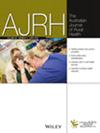Impacts of University Departments of Rural Health to Their Regions Through Intellectual Capital
Abstract
Objective
This paper aims to identify ways in which University Departments of Rural Health (UDRHs) contribute intellectual capital to their rural and remote regions.
Background
UDRHs contribute to their regions through various means, including student placements, workforce development, First Nations support and training, community engagement, economic impacts and research. UDRHs also contribute to various forms of community capital, although there remains a lack of detailed understanding of how UDRHs contribute to the intellectual capital of their regions.
Methods
Senior staff from six UDRHs worked from a constructivist research paradigm as ‘insider’ researchers to identify four key avenues through which UDRHs contribute and enhance intellectual capital in their regions. For each avenue, a case study was developed to examine these contributions in detail.
Results
The four case studies illustrate how different UDRHs contribute intellectual capital through students and health professional education and training, community partnerships to address local issues, research and research capacity building and through UDRHs networks that cross regions and rural–urban boundaries. UDRHs were found to contribute to health practice, local evidence, partnerships and advocacy, all benefiting their regions.
Conclusion
The co-production of locally tailored knowledge by UDRHs offers a valuable contribution to rural and remote communities. The knowledge and evidence contributed by universities is often not provided by other sectors in rural areas, but is valued by communities, contributes to intellectual capital in these regions, and bridges the urban–rural knowledge divide.

 求助内容:
求助内容: 应助结果提醒方式:
应助结果提醒方式:


